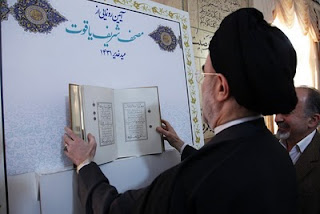"And mention, [O Muhammad], in the Book [the story of] Mary, when she withdrew from her family to a place toward the east.
And she took, in seclusion from them, a screen. Then We sent to her Our Angel, and he represented himself to her as a well-proportioned man
She said, "Indeed, I seek refuge in the Most Merciful from you, [so leave me], if you should be fearing of Allah."
He said, "I am only the messenger of your Lord to give you [news of] a pure boy."
She said, "How can I have a boy while no man has touched me and I have not been unchaste?"
He said, "Thus [it will be]; your Lord says, 'It is easy for Me, and We will make him a sign to the people and a mercy from Us. And it is a matter [already] decreed.'
So she conceived him, and she withdrew with him to a remote place.
And the pains of childbirth drove her to the trunk of a palm tree. She said, "Oh, I wish I had died before this and was in oblivion, forgotten."
But he called her from below her, "Do not grieve; your Lord has provided beneath you a stream.
And shake toward you the trunk of the palm tree; it will drop upon you ripe, fresh dates.
So eat and drink and be contented. And if you see from among humanity anyone, say, 'Indeed, I have vowed to the Most Merciful abstention, so I will not speak today to [any] man.'
Then she brought him to her people, carrying him. They said, "O Mary, you have certainly done a thing unprecedented.
O sister of Aaron, your father was not a man of evil, nor was your mother unchaste."
So she pointed to him. They said, "How can we speak to one who is in the cradle a child?"
[Jesus] said, "Indeed, I am the servant of Allah. He has given me the Scripture and made me a prophet.
And He has made me blessed wherever I am and has enjoined upon me prayer and zakah as long as I remain alive.....
That is Jesus, the son of Mary - the word of truth about which they are in dispute."
There is much beauty in the Quranic version of the birth of Jesus(AS) and much emphasis on the human nature of Jesus and his first miracle, speaking upon birth. The most important notion given is that the Holy Quran is so strong and confident of its message that it devotes a major part of its discourse to a narration of other Prophets and events related to their lives. The Quran conveys the message of Adam, Noah, Abraham, Moses, Jesus and many other Prophets to emphasize on the continuity of Revelation and the evident Truth behind it.
Jesus has come as a great tiding to humanity for worship of God and denial of oppression and deceit. According to Islamic tradition , Jesus (AS) will return with the awaited Mahdi to bring peace and love back to a war stricken and depressed world.
So eat an
So eat and drink and be contented. And


